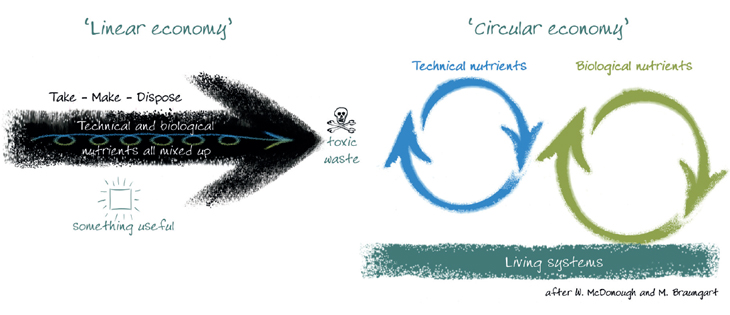Circular economy
[No extraction - No emission]
Needs revision...

Our economy's current purpose is to maximize flows (of goods, capital). It is a machine for perpetual growth that uses its profits and its knowledge to continually escalate its demands on humanity and on the earth and to constantly multiply its capacity to inflate itself as private wealth and power. As such, it is brittle and prone to breakdown, undermining productive activity as well as leading to the abuse of the commons in a never ending spiral.
Principle: The challenge we are facing is to ensure the conditions under which profit and growth can be viable and sustainable, and improve at the same time the material and non-material (intellectual, emotional, spiritual...) wellbeing of the people, and the viability of the commons that enables it.
Emergence: The "circular economy" model focuses on optimizing the flow of goods and services over time in relation to the size of capital and resources (stocks). It is a replenishing and regenerative model based on closed loops and systems resilience, and the rebuilding of natural and social capital. Products are designed for more complex cycles of disassembly and reuse, the out-design of waste and toxic emissions.
Amplificators: Introducing clarity between consumables and durables, it puts the responsibility of the performance of the product and its becoming as a new resource at the end of its life on the producers, leading to a whole new approach of production, consumption and ownership as it encourages leasing, renting and sharing while giving way to new approaches of business co-evolution and integration of the commons.
Positive feedback: The circular economy can contribute to create a positive entrainment effect. In the economic sphere there is an acknowledgement that as externalised costs become internalised benefits prices will increasingly reveal full costs. This entails a natural shift towards renewables and internalization of externalities. In systems terms the system will be exhibiting increased interdependence and the use of different scales, niches and possibiities. See The circular Economy and the Compression Institute.
Application: In the spirit of circular economy closed loop urbanization and community utility & production systems and projects and initiatives that have multiple effects, and serve several different objectives, such as co-generation, closed water/energy/food production systems or solutions such as developed by the Blue Economy or systemic approaches around buildings/energy/transport should be encouraged. More generally, sustainability as "circular economy", also involves that whatever available resource or asset businesses or other economic actors don't use, other parts of their environment can, with mutual benefits. This includes local policies to make use of idle resources to strengthen local economies.